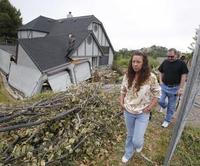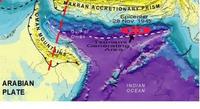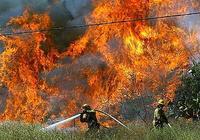-
California community sinking into the ground, and engineers are baffled

Several homeowners in the community of Lake County, California are faced with a problem: their houses are sinking into the ground and they do not know why. The situation has been deteriorating steadily, and now mail delivery has been cancelled in the area, and city and county crews have been forced to change the subdivision’s sewage line to an overland pipe as a result of manhole collapses.
-
-
A “cauldron of events” has brought the nuclear industry to a halt
Until two years ago, people talked of a nuclear energy renaissance. Now the talk is about nuclear malaise. The Fukushima scare, the emergence of alternative energy sources as a result of fracking, and the lack of action on climate change – which means that limits on fossil fuels are not coming any time soon – have, in the words of one experts, brought the nuclear industry to a halt.
-
-
Hazard of Western Indian Ocean earthquake, tsunami greater than thought

Earthquakes similar in magnitude to the 2004 Sumatra earthquake could occur in an area beneath the Arabian Sea at the Makran subduction zone, according to recent research. The study suggests that the risk from undersea earthquakes and associated tsunami in this area of the Western Indian Ocean — which could threaten the coastlines of Pakistan, Iran, Oman, India, and potentially further afield — has been previously underestimated.
-
-
Assessing asteroid risk to Earth
Of the more than 600 000 known asteroids in our Solar System, almost 10 000 are classified as near-Earth objects, or NEOs, because their orbits bring them relatively close to Earth’s path. A dramatic proof that any of these can strike Earth came on 15 February, when an unknown object thought to be 17-20 meter in diameter arrived at 66 000 km/h and exploded high above Chelyabinsk, Russia, with 20-30 times the energy of the Hiroshima atomic bomb.
-
-
Silica particles purify water by acting as oil magnets
Engineers develop an innovative method designed to purify water through the rapid removal of oily pollutants. The technology involves the deployment of surface engineered silica particles, which act as oil magnets in water, adsorbing oil, yet repelling water.
-
-
New grass hybrid helps reduce runoffs, flooding

Scientists use hybridized forage grass to combine fast root growth and efficient soil water retention. Field experiments show Festulolium cultivar reduces water runoff by up to 51 percent against nationally-recommended cultivar. The hybrid captures more water and reduces runoff and likelihood of flood generation.
-
-
Lower waves' impact on coastal communities uncertain
Coastal impacts of climate change studies have predominantly focused on the influence of sea-level rise and, until now, not focused on how changing wave conditions will impact the coastal zone in a changing climate. Scientists note, though, that waves are dominant drivers of coastal change in these sandy environments, and variability and change in the characteristics of surface ocean waves can far exceed the influences of sea-level rise in such environments. Since warmer oceans will see lower waves, the effect of warming on coastal communities is uncertain.
-
-
U.S. may acquire additional land for constructing border fence
A U.S. Customs and Border Protection (CBP) draft plan regarding the final sections of the border fence that separates the United States from Mexico could impact about 100 people, most reside in a nursing home, according to federal documents.
-
-
California braces for out-of-control wildfires

The lack of precipitation over the past two winters has California and federal officials concerned about the impact wildfires could have in the summer months. California has already recorded 845 wildfires this year, a 60 percent increase compared with the average for the previous five years.
-
-
Draft of the 2013 U.S. National Climate Assessment is out
As mandated by the U.S. Global Change Research Act (GCRA), the U.S. Global Change Research Program (USGCRP) is currently producing a National Climate Assessment (NCA). The NCA is a report to inform the president, the Congress, and the American people about the current state of scientific knowledge regarding climate change effects on U.S. regions and key sectors, now and in the coming decades. The National Research Council (NRC) says that as the United States continues to engage with the threats, opportunities, and surprises of climate change in its many manifestations, the 2013 NCA should prove to be a valuable resource.
-
-
DHS chemical plant security program hobbled by problems, poor oversight
A DHS program responsible for the security of chemical facilities, such as the West Fertilizer Company plant in Texas, has been ineffective owing to a number of issues, leading federal investigators to wonder “whether it can achieve its mission, given the challenges the program continues to face.”
-
-
EPA slams State Department’s Keystone XL pipeline review
The Environmental Protection Agency (EPA) on Monday criticized the State Department’s environmental impact review of the Keystone XL pipeline, saying there was not enough evidence to back up key conclusions in the review on emissions, safety, and alternative routes. The EPA’s comments could have a negative effect on the approval of the project, but if the project is approved, the comments could serve as supporting evidence in any ligation against the pipeline.
-
-
River beds keep moving, increasing flood risk
A detailed study of shifting river beds could hold the key to more accurate flood prevention. It is commonly believed that the elevation of river beds is more or less constant, so any change in flood risk is due to changes in hydrology. Researchers find, however, that there is a significant trends in the elevation of river beds, an indication that river channels are filling in with sediment or that sediment is being eroded through time.
-
-
Interior Dept. releases progress report on U.S. Water Census
The U.S. Interior Department issued released a report to Congress on the progress of the National Water Census. As competition for water grows — for irrigation of crops, for use by cities and communities, for energy production, and for the environment — the need for the National Water Census and related information and tools to aid water resource managers also grows. The Water Census will assist water and resource managers in understanding and quantifying water supply and demand, and will support more sustainable management of water resources.
-
-
Scientists discover new materials to capture methane
Scientists have discovered new materials to capture methane, the second highest concentration greenhouse gas emitted into the atmosphere. Unlike carbon dioxide, the largest emitted greenhouse gas, which can be captured both physically and chemically in a variety of solvents and porous solids, methane is completely non-polar and interacts very weakly with most materials.
-
- All
- Regional
- Water
- Biometrics
- Borders/Immig
- Business
- Cybersecurity
- Detection
- Disasters
- Government
- Infrastructure
- International
- Public health
- Public Safety
- Communication interoperabillity
- Emergency services
- Emergency medical services
- Fire
- First response
- IEDs
- Law Enforcement
- Law Enforcement Technology
- Military technology
- Nonlethal weapons
- Nuclear weapons
- Personal protection equipment
- Police
- Notification /alert systems
- Situational awareness
- Weapons systems
- Sci-Tech
- Sector Reports
- Surveillance
- Transportation
Advertising & Marketing: advertise@newswirepubs.com
Editorial: editor@newswirepubs.com
General: info@newswirepubs.com
2010-2011 © News Wire Publications, LLC News Wire Publications, LLC
220 Old Country Road | Suite 200 | Mineola | New York | 11501
Permissions and Policies
Editorial: editor@newswirepubs.com
General: info@newswirepubs.com
2010-2011 © News Wire Publications, LLC News Wire Publications, LLC
220 Old Country Road | Suite 200 | Mineola | New York | 11501
Permissions and Policies
